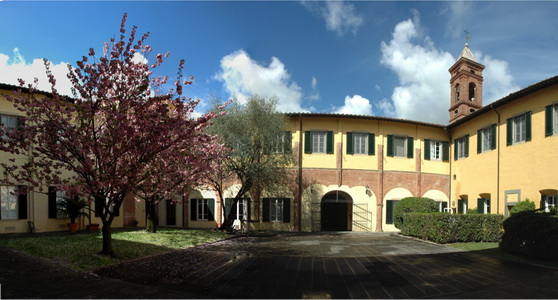
Sant’Anna School of Advanced Studies
Scuola Superiore Sant’Anna (SSSA) is a public university whose mission is to address excellence in both education and research in engineering, medicine, agriculture, economics, management, law and political science. In 2013, SSSA was assessed as the top Italian University (among all ‘small’ universities) by the ANVUR, the National Agency for the evaluation of the all Italian universities and research centers. In the Times Higher Education raking of young universities, released in April 2016, SSSA is listed 10th worldwide among institutions that are aged 50 or younger and 5th worldwide among institutions that are aged 30 or younger.
Research and Innovation activities of NeuHeart will be carried out in three different Institutes with three main PIs: the BioRobotics Institute (T-BRI), the Life Science Institute and the Institute of Law, Politics and Development, four of the six institutes in which SSSA research portfolio is divided into.
Within NEUHEART, SSSA will be responsible of the following activities: project coordination and management (WP1), development of the regenerative autonomic interface (WP2), integration validation with animal models of the NeuHeart systems (WP7), analysis of the regulatory, ethical, legal, and economic issues (WP8). SSSA will also collaborate with IMM on the development of the biomechatronic sensors (WP4).
The BioRobotics institute (T-BRI) is a center with more than 200 researchers that carries out cutting-edge research activities in impacting sectors of technological innovation: it is located in a technological park in Pontedera (Pisa, Italy), with a surface of 6,300 square meters and advanced facilities for design and fabrication of any custom component relevant to develop a bio-robot. In 2013, T-BRI was ranked first among all the 137 Italian departments of industrial and information engineering. The peculiarity of T-BRI is its capability to perform excellent research according to the standards of the biorobotics communities (i.e. high-impact-factor publications), and to foster at the same time the application and the exploitation of the research results, for the benefit of industry and the various communities of users. T-BRI, thanks to many ambitious international and national collaborative projects, has built and consolidated a vast wealth of knowledge and expertise in different fields such as neural engineering, biomedical signal processing, neuro-robotics, wearable robotics, rehabilitation robotics, as well as the know-how and advanced facilities to build robotic components at different (nano-, micro-, milli- and meter-) scales.
In NEUHEART, T-BRI will be involved with the Translational Neural Engineering Area, led by Prof. Silvestro Micera, who is the PI of NeuHeart as well (TNE Lab, http://sssa.bioroboticsinstitute.it/research/TNE_Translational_Neural_Engineering) and with the Human Machine Nexus Laboratory, led by Dr. Calogero Maria Oddo (HMN Lab,http://www.santannapisa.it/en/human-machine-nexus-laboratory). The main goals of the TNE Area are (i) to increase our basic knowledge of how the nervous system works, and (ii) to develop systems able to restore sensorimotor functions in people affected by different types of neural disability. The TNE lab is currently working on the following research areas: (i) neural interfaces; (ii) computational neuroscience; (iii) translational neurorehabilitation; (iv) neuroprosthesis and bionics; and (v) locomotion biomechanics. The TNE lab is also actively involved in two joint laboratories on “neural control of movements” (with the University of Pisa and the University Hospital of Pisa, Prof. Bruno Rossi and Dr. Carmelo Chisari), and on “translational neurorehabilitation” (with the Institute of Neuroscience of the Italian National Research Council, CNR, Dr. Matteo Caleo). The HMN Lab mainly targets the engineering of an artificial tactile sense in parallel to the investigation of the neuronal mechanisms of human touch.
The Unit of Translational Critical Care Medicine (TRANCRILAB) of the Institute of Life
Sciences of Scuola Superiore Sant’Anna is coordinated by Prof. Vincenzo Lionetti, who has more than 15 years of experience in cardiovascular pathophysiology and experimental models of acute and chronic heart failure. Prof. Lionetti is internationally recognized for his studies on the development of new epigenetic approaches to both protect and repair the myocardium exposed to ischemic microenvironment. The peculiarity of TRANCRILAB is to address the different aspects of translational research in the field of perioperative medicine and critical care medicine focused on cardioprotection using cutting-edge technologies, multimodal imaging platform, clinically relevant small and large animal models of cardiac injury.
TRANCRILAB has access to large and small animal surgical suite, magnetic resonance imaging,(1.5 and 3 tesla), echocardiography, micro- and macro-PET and CT-PET. TRANCRILAB has,also access to laboratory animal breeding facility that can house up to 40 pigs and 3000 rodents, which was formed by the joint contributions of the National Council of Research (Pisa, Italy).
TRANCRILAB acts as a consultant to several international, national and local research institutions both public and private, and biomedical companies as well. TRANCRILAB provides specific knowhow on gold standard monitoring of cardiovascular function, experimental evaluation of novel approaches of cardiac surgery and cutting-edge molecular biology techniques to several prestigious external partners and organizations from different backgrounds.
The DIRPOLIS Institute offers numerous activities, both for university students and post-graduates, in which the results of the scientific research conducted by its faculty staff and researchers can be integrated. It also organizes advanced training in various fields, aimed at professionals who want to increase their knowledge and skills. The Institute acts as a consultant to several international, national and local institutions, both public and private. It also acts as a forum for discussion on the topics of its research, and the results are disseminated at conferences, symposia, seminars and workshops, held both in Italy and abroad. Prof.ssa Erica Palmerini will work in NeuHeart about the regulatory and ELSE (ethical, legal, social and economic) aspects of NeuHeart, providing a precious insight of its impact on European society.
